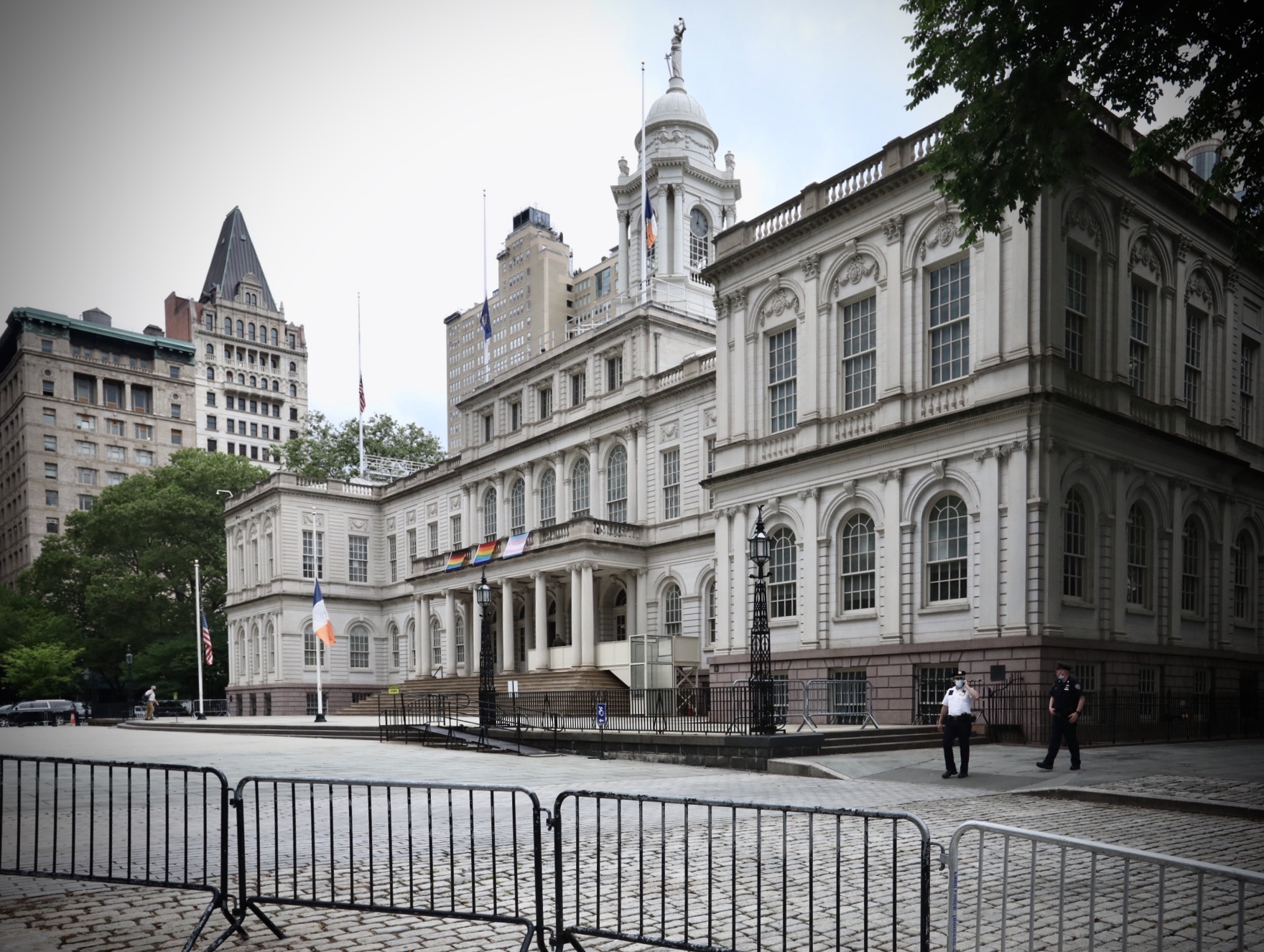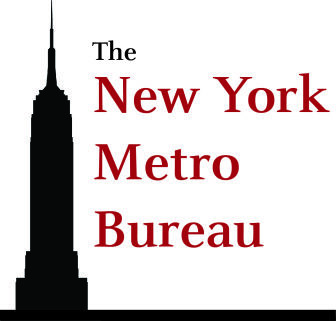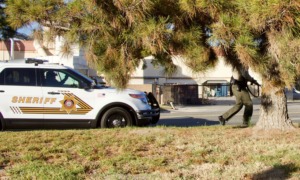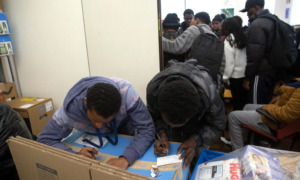
Marco Poggio
.
NEW YORK — As a budget deadline looms for New York today, the city’s Public Advocate said he will hold up the budget if he does not get commitments for massive reforms to how school safety is administered.
The current budget does not do enough to rein in the city’s police department, particularly the New York Police Department-led public school safety program,, Public Advocate Jumaane Williams said in a statement released today.
“As we near the final budget vote, it has become clear to me that this budget ignores some of the most critical elements of reducing NYPD funding and redefining public safety,” he said. He vowed to hold up the budget unless both Mayor Bill de Blasio and the City Council commit to both a general hiring freeze of police and an overhaul of the school safety program.
 Signalling his commitment to shifting the school safety program in a press conference today, de Blasio outlined his vision for how he plans to return control of the school safety program to the Department of Education.
Signalling his commitment to shifting the school safety program in a press conference today, de Blasio outlined his vision for how he plans to return control of the school safety program to the Department of Education.
“What’s important to understand here is in the first year of the transition, there will be a growing leadership function played by school leadership,” he said. “Officers will be trained by the DOE. There will be a heavy focus on restorative justice, social, emotional learning, deeper dialogue with young people.”
For over 21 years, the NYPD has been providing security to public schools in New York through a mutual agreement between the two departments first signed in 1998.
The original agreement was set to expire in 2002 but was extended in January 2003 by Mayor Michael Bloomberg without public knowledge, until it was revealed in 2009 by former Assemblyman Karim Camara during a debate over public schools.
The agreement was designed to remove what was, at the time, a badly mismanaged school safety program from the Department of Education, and turn it into a professional law enforcement operation by transferring training and background checks to the NYPD.
Bloomberg’s agreement was changed in June 2019 by de Blasio’s administration. The new agreement called for fewer arrests for low-level offenses, more social workers and an increased emphasis on conflict resolution.
Zachary Tumin, one of the last leaders of the school safety program under the Department of Education, recalls that a high crime rate in the 1990s and political pressure from elected officials prompted the department to turn over control of security to the NYPD.
“There was a much larger struggle going on between Mayor [Rudolph] Giuliani, and Schools Chancellor Ramon Cortines over the direction of the New York City public schools, and the tussle was around who could do the better job, which organization was better to do it,” Tumin said of the decision to turn over control.
Though Tumin, now a professor of public affairs at Columbia University, believes the NYPD has succeeded in running a professional security operation, they could do more to collaborate with students and teachers on how to provide security in schools, he said.
Progressive teachers want NYPD contract ended
In the past several weeks, the city’s public school teachers have also increased pressure on the Department of Education to sever ties with the NYPD amid ongoing demonstrations calling for cuts to the police budget.
Led primarily by groups of progressive teacher groups like Teachers Unite and the Movement For Rank-and-File Educators (MORE), members are demanding that the city’s top education officials end a nearly $500 million contract with the NYPD to handle school safety.
Caitlin Delphin, a special education teacher at a Brooklyn high school, said the topic has produced vigorous debate among teachers across the city.
“The part that there’s consensus on, and a part that I also really support, is making sure that there is no culture of policing in schools,” she said, adding that even subtle elements of policing like wearing uniforms similar to those of the NYPD can disrupt the delicate learning environment by making students feel less safe.
Also a member of Teachers Unite, which advocates for alternatives to policing in public schools, Delphin uses a new approach to classroom management called restorative justice that she believes can help eliminate a need for school safety agents altogether.
“Part of restorative justice the way we do it is to not avoid conflict, but just provide strategies and coping skills so that when conflict does arise, it can be resolved in a way that’s productive and helps to move things forward,” she said.
Major labor union won’t comment on police
The plan to remove police outright remains controversial.
Though restorative justice as defined by Delphin works as a kind of conflict-mediation approach, the actual mechanics of how it could de-escalate potentially violent situations, such as when students bring firearms into schools, remains unclear.
Teachers like Delphin, however, remain dead-set on removing police from schools, particularly in high schools, where she says some NYPD school safety agents can carry firearms and metal handcuffs. The NYPD presence may have unintended side effects, she said.
“I think it creates an environment that many of our students feel more unsafe in,” Delphin said, adding that “until the system of policing is gone, our students won’t truly be safe in their schools.”
The question about how to navigate school safety in New York is even dividing the United Federation of Teachers (UFT), the powerful labor union for public school teachers.
UFT would not directly support plans to remove officers in a recent statement, instead indicating that they are more focused on returning to in-person learning in the fall.
This decision to not support removing officers has created tension within the union, with groups of members demanding the union take a stronger stance.
MORE, a progressive caucus within UFT, has also been particularly vocal about ending the agreement between the Department of Education and police. Around mid-June, MORE passed a resolution calling on the Department of Education to end their agreement.
Recently the Department of Education has signaled a willingness to respond. On June 18, the governing body for the Department of Education, the Panel for Education Policy (PEP), passed a resolution calling on de Blasio to terminate the agreement.
Last week, the City Council appeared to go along with the PEP resolution, indicating they could support a dramatic shift in how school safety is administered in New York,with members agreeing with teachers like Delphin who want to see more money go toward counselors or therapists instead of school safety officers.
Council Members Mark Treyger, chair of the education committee, and Donovan Richards, chair of the public safety committee, released a joint statement on June 17 in support of the plan to cut NYPD ties.
“Students need more social and emotional supports,” the statement read. “A seven-year-old having a bad day in a school without a social worker is not an NYPD issue. School safety personnel still have a role to play in keeping children safe but as part of a holistic approach to school climate led by school leaders, not as a fiefdom of the NYPD operating within schools.”
Not all members have been so quick to make up their minds.
Some, like Council Member Vanessa Gibson, indicated that though she remained committed to reallocating money from the NYPD, she is not sure about removing NYPD from public schools.
“I do not have an official position yet on the removal of School Safety Agents from our public schools as I am getting a lot of information on both sides and still reviewing the information,” Gibson said in a statement on June 17. “The City Council is actively working on a budget to ensure that important programs are funded and our youth have employment, summer camps and other summer activities.”






























